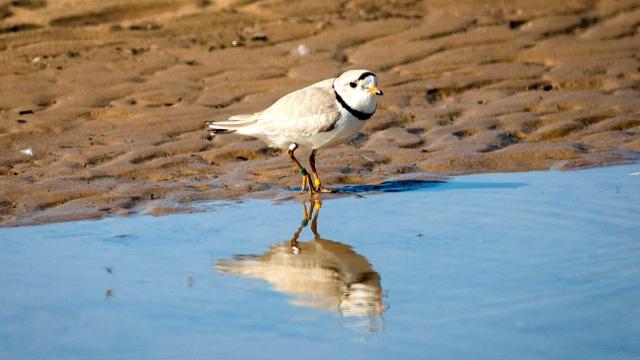The declining status of some tiny birds in Texas could spell bad news for Elon Musk and his planned expansion at the SpaceX Boca Chica launch facility.
SpaceX is hoping to build out its South Texas launch facility (dubbed “Starbase” by the company) to support the development of its massive, super-powerful Starship rocket. But an investigation from the U.S. Fish and Wildlife Service reported that populations of snowy and piping plovers — two shorebird species — have already dropped drastically near the existing SpaceX site. Boca Chica has recently hosted launches and failed launches, and those efforts may have been hurting wildlife.
The findings come from a FWS draft letter submitted to the Federal Aviation Administration that’s been obtained and published by CNBC. The document also referenced possible negative environmental impacts on multiple sea turtle species, as well as other shorebirds, like red knots, should the expansion proceed as planned.
To move forward with Starship testing and launches, SpaceX will have to monitor and manage the harm its operations at Boca Chica are causing to wildlife, according to the draft document. However, and as CNBC’s report points out, the steps necessary for environmental approval as laid out in the letter are small potatoes for a company like SpaceX. Indeed, most of the required mitigation efforts, such as implementing noise and light monitoring, placing waffle boxes over loud generators, and having to inform FWS in the event an endangered species is accidentally killed, does seem like low-hanging fruit.
Piping plovers are listed as a federally threatened species, and are considered endangered in some regions. The western population and sub-species of snowy plovers is also listed as threatened.
Surveys and an analysis of habitat near the Boca Chica site found that piping plover overwintering numbers fell by more than half between 2018 and 2021. FWS reviewed recent biological surveys and research done in the area, leading to the draft letter. The “downward trend is significant and continuous and may indicate Boca Chica is becoming a population sink,” the letter, signed by Charles Ardizzone, a supervisor for the Texas Coastal Ecological Services Field Office, explained.
“It is not clear what happened to the ‘missing’ plovers, but if SpaceX activities have resulted in the loss of over half the Boca Chica population then the entire critical habitat is being impacted,” according to the letter. The document goes on to list some possibilities for what happened to the birds: direct death from explosions and tests; chronic injury from the heat, pressure, and debris of launch tests; habitat loss; or displacement from noise.
“However the losses do appear to represent a real loss in the entire population and it is not likely the birds simply ‘went somewhere else’,” continued the letter. “It is reasonable to assume that the factors that have resulted in this sharp decline on this species are also affecting many others that occupy the area in greater abundance.”
Two other species of plover were also surveyed between 2017 and 2021, and “results indicate that the population of snow plovers also had declined significantly,” the letter continued. “Both species are now nearly absent from the [launch area].”
Without proper intervention and precautions, the proposed expansion to Boca Chica could make these impacts even worse. Adding to the site could also hurt red knots (another bird species), as well as multiple species of sea turtles on account of noise, heat, vibration, and light that come along with construction and operating a launch site, according to the FWS letter.
The current Boca Chica launch site occupies dunes, marsh, tidal flats, and other sensitive habitat. SpaceX is looking to build out onto another 17 acres of mudflat and wetlands — adding launch and landing pads, parking lots, integration towers, and other infrastructure. Because the proposed expansion involves wetlands, it requires approval from the U.S. Army Corps of Engineers under section 404 of the Clean Water Act. However, the Army Corps suspended SpaceX’s application for approval in March, citing insufficient information from SpaceX. The company needs to submit the required information should it wish to restart the process.
On top of the necessary Army Corps approval, SpaceX is also waiting on an FAA environmental assessment that has already been delayed five times, according to a report by Texas Public Radio. Most recently, the FAA assessment release date was moved from April 29 to May 31.
The letter from Fish and Wildlife is presumably being considered as part of that FAA assessment and could contribute to further delays. If the FAA assessment concludes that a full-scale environmental impact statement is needed, the process could take years to complete.
In February, Musk said he was considering moving Starship operations away from Texas to Cape Canaveral and Kennedy Space Centre in Florida, while transitioning Boca Chica to a research and development site. The outcome of the FAA review could make that possibility a reality.
“To minimise potential impacts to listed species and critical habitat units, SpaceX will implement [the] Terms and Conditions outlined in [this letter] and the attached associated plans,” the draft letter explained. However, those terms and plans might not be nearly enough.
CNBC reported that Jared Margolis, a senior attorney with the Centre for Biological Diversity, reviewed the Fish and Wildlife letter and found that it could actually be good news for SpaceX. “It seems the Fish and Wildlife Service is bending over backwards to figure out a way to permit more of what has been a very detrimental use of the Boca Chica site as far as impacts to wildlife go,” Margolis told CNBC.
Even though “Starbase” poses serious possible harm to wildlife, Fish and Wildlife is asking SpaceX to make relatively few adjustments and very low financial investment in wildlife conservation to address its concerns, added Margolis. Many of its requests are also recommendations, not FAA-enforceable requirements.
Neither U.S. Fish and Wildlife nor SpaceX immediately responded to Gizmodo’s requests for comment.
